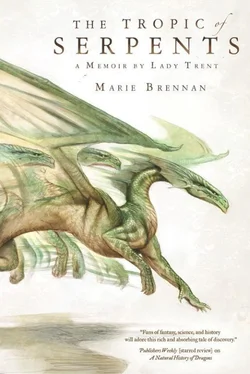With that, he had to be content. By then the footman was hovering behind my shoulder, looking distressed at the prospect of having to forcibly evict a baron from the premises, but determined to do so if necessary. (Clomers was a very good footman, the best I ever had.) Half-fuming, half-dejected, Lord Denbow returned to his carriage, and so away.
Once he was well down the drive, I deflated a bit myself. “If he comes back, do not let him in,” I said wearily to Clomers; and, having received his stout agreement, I went upstairs to my study.
Natalie was sitting in front of my desk.
I very nearly swallowed my own tongue at the sight of her. While one part of my brain sorted out the contradictory impulses of gasping, shrieking, and demanding an explanation of her, the rest noted certain details: the open window on the side wall, overlooking a fine (and easily climbed) oak tree; the fierce and frightened look in Natalie’s eyes; the small valise on the floor at her feet.
“He locked me up,” she said, sounding almost as if she could not believe it. “We argued for days, and when I told him I was going whatever he said, he locked me up. Him and Mama. I am sorry to have made you a liar.”
“She only lies who tells a falsehood knowingly,” I said, as if such distinctions were at all the most relevant thing at hand.
Natalie drew in a breath, and the unsteadiness of it advertised her distress. “I fear I have made a great deal of trouble for you. I came here intending to go with you tomorrow—but if I do, Papa will be infuriated.”
If she did not, then she would have little choice but to return to her family. And while they might have what they perceived as her best interests at heart, the disjunct there was severe enough to send Natalie up my tree and through my window, and who knows what else before that. Her actions, more than any words, told me that return was simply not to be borne.
Her grandfather might protect her against the worst of it—but a better protection would be to go beyond her family’s reach. “Your father will have to be infuriated in Scirland,” I said, the dryness of my tone covering for any temporary quailing of spirit. “He doesn’t have a visa for Nsebu, and isn’t likely to get one anytime soon.”
Hope kindled new life in her posture. “Do you mean—”
“The ship leaves tomorrow,” I said. “We must think of how to get you on it.”
* * *
We smuggled her on board by way of the workers’ gangway, where her father would never think to look. With Natalie dressed in the clothes of a laborer (yes, trousers and all) and a sack of potatoes on her shoulder, Lord Denbow never had the slightest chance of spotting her.
He was there, of course, and made a great protest, insisting to the gathered members of my family (Paul and Judith; my mother and father; my favourite brother, Andrew; Matthew and Sir Joseph, who was my father-in-law) that I had kidnapped Natalie.
“I have not kidnapped her, my lord,” I said, covering my nervousness with irritation. In his distress, he had not yet thought to ask me outright whether I had seen his daughter. If he did, I would have to make up my mind whether to lie, and a sleepless night of pondering that very question had failed to supply me with an answer.
I had kept my word, if only halfheartedly, talking with Natalie of his concerns. The conversation had failed to divert either of us from our course. My one source of apprehension was that I had no opportunity to speak privately with certain individuals, namely, Mr. Wilker and Lord Hilford. The former would be coming with me on this expedition, and the ear not occupied by Lord Denbow’s furious expostulations was being filled with my mother’s insistence that in addition to it being madness for me to go abroad, it was even more mad to do so without any kind of female companion. Marriage had provided me with a mystical shield against impropriety, one not entirely lost with widowhood, but she still feared rumour. (In fairness to her, I must say she was right to do so. But I get ahead of myself.)
Lord Hilford, I thought, had guessed something of what was going on, though whether he knew I was actively helping Natalie, I could not say. I did, however, see him draw Mr. Wilker aside upon his arrival, and whatever he said turned Mr. Wilker’s face to stone. That done, Lord Hilford set himself to diverting his son as best he could. They went together to examine my cabin, to satisfy Lord Denbow that Natalie was not there; I hoped she had found a good place to conceal herself until we were well away from shore.
Andrew, to my pleasure and relief, set himself the same task with our mother, and accompanied me on board when the time came, as he had done when I departed for Vystrana. “So, where are you hiding her?” he asked as we crossed the deck.
A heavy step brought my head around. Mr. Wilker had joined us, pacing to my right, leaving me feeling trapped between them. But Andrew was grinning as if it were all a tremendous lark, and the grim set of Mr. Wilker’s jaw told me he would not be surprised by anything I might say.
“She is hiding herself,” I said. “I honestly don’t know where. This was her decision, you know, though I support her in it.”
“Miss Oscott is even less sane than you are,” Mr. Wilker said.
“Then she’s in good company,” I said lightly. That would not be the end of it, I knew; but Mr. Wilker would not go against Lord Hilford’s clear wish, that his granddaughter be permitted her escape. He was too loyal to the earl, and owed him far too much. What arguments we would have—and oh, did we have them—would come later.
Our ship was the Progress, the famed steamship that for many years formed the primary link in the Scirling-Erigan trade. Built from Erigan steel and fueled with Scirling coal, it was a symbol of the partnership inaugurated by the Nsebu colony—at least, it was seen as a partnership on our side of the ocean, though the truth was less balanced than that word implies. The bulk of its capacity was given over to cargo, some of which would be scattered through various ports like seeds as we made our journey, the rest traded in Nsebu before the holds were filled once more with iron, gold, ivory, and more. But the Progress was the jewel of that sea route, and so it also had passenger cabins, well equipped for the comfort of the dignitaries who occupied them. The three of us were hardly dignitaries, but Lord Hilford qualified, and had arranged for us to travel in style.
We met him emerging from my cabin with Lord Denbow behind him. Or rather, Lord Hilford emerged; his son charged, backing me against a wall. “Enough of this, Mrs. Camherst! You will tell me where my daughter is, or—”
My brother was already stepping to defend me. I was very glad that Lord Hilford intervened, before I had to discover what Andrew would do. “Lewis! Control yourself. Or do you want the crew to drag you bodily off this ship? You are making a scene.”
All hail that bane of the upper class, a scene. The spectre of being publicly shamed was enough to check Lord Denbow. It was not enough to calm him, but with his momentum broken, the baron knew he could not prevent the ship from departing. And if he attempted to detain me, he would face any number of consequences. He could not decide what to do before his father took him firmly by the arm and dragged him away, not quite by force.
Still, he indulged in one final accusation, shot over his shoulder. “You will ruin her life.”
“I have not ruined my own, Lord Denbow,” I called after him. “Trust your daughter to find her own way.”
* * *
Natalie emerged when we were out of Sennsmouth harbor, and once she was properly attired, I called Mr. Wilker in.
Читать дальше












